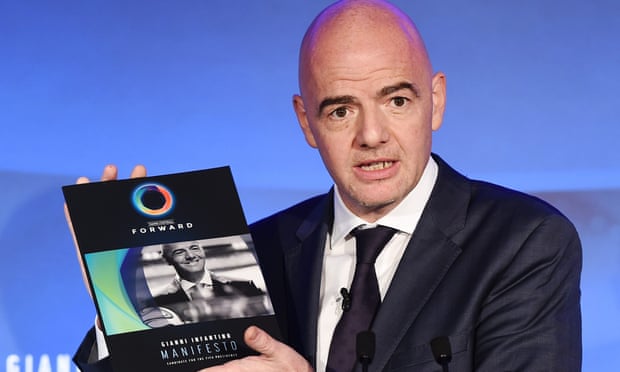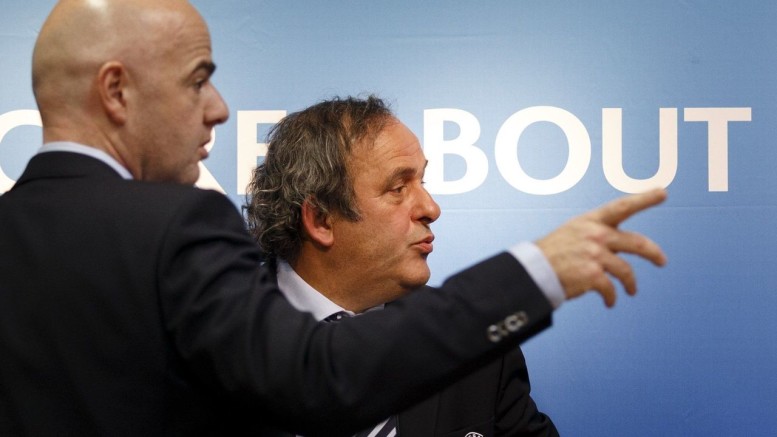A small, bald lawyer is expected to revolutionise football, but high expectations are premature.
The election of Gianni Infantino is largely perceived as a new chapter for FIFA and for football in general, the start of a reform that will rid the beautiful game of corruption and will result in all 209 of the governing body’s members holding hands and singing national anthems together. It’s a nice idea, and the standard to which he is being held by so many people should be applauded.
That being said, it would be absurd to suggest that Infantino will completely rid FIFA of the issues that have long plagued it. Can he usher in any meaningful change? That, too, may be unlikely.
Related: Gianni Infantino elected as FIFA president
First of all, it should be noted that almost anyone in Infantino’s position would look like an angel given the alternatives. He is replacing Sepp Blatter, a man who believes homosexuals should refrain from sex at the 2022 World Cup and that race rows can be settled with simple handshakes. He was also running against Sheikh Salman bin Ebrahim al-Khalifa, a man accused of complicity in the systematic imprisonment and torture of Bahraini athletes during a bloody crackdown on pro-democracy protesters in 2011.
Related: FIFA avoids further disgrace with Sheikh Salman’s defeat
None of that is to Infantino’s discredit. It merely needs to be pointed out.
The question must be begged, however: Is Infantino, despite his clean hands and charm, the best person to lead FIFA into a brave new world? Just over half of the governing body’s member associations seemed to think so, and many of those voted in his favour only after it was clear that Prince Ali Bin Al Hussein was no longer in the running.
Then there’s the issue of Infantino’s ties to Michel Platini, who is banned from all football-related activities for six years due to a “disloyal payment.” While the former certainly seems less corrupt than the latter, an apple-doesn’t-fall-far-from-the-tree concern is more than justified.
If the benefit of the doubt is given to Infantino, and it’s presumed that he is indeed the best person to be FIFA’s ninth president, the following question is simple: Why? He promises transparency and backed the new package of reforms that were passed before his election, but that didn’t set him apart from the pack of other candidates.
Arguably the most defining component of his campaign, Infantino is an ardent supporter of putting more cash in the hands of FIFA’s member associations, each of whom is promised $5 million over four years, while each of the six governing body’s confederations is promised $40 million. The amounts are set in his slick-looking manifesto.

(Courtesy: The Guardian)
Infantino’s plans for distributing money present a number of problems. Not only can it be viewed as a means of purchasing votes, but it is a continuation of Blatter’s plan for FIFA at a time when football’s governing body is supposed to be separating itself from its former kingpin. The worldwide representative organisation for all footballers, FIFPro, sees a problem.
From FIFPro’s official website:
FIFPro takes a dim view of today’s FIFA election that leaves the new President, Gianni Infantino, entrenched in a governance structure and culture that is open to corrupt practices.
Despite a package of reforms approved today by FIFA, FIFPro fears placing increased power in the hands of FIFA’s 209 member associations lies at the heart of the problem. These organisations are not representative of the game and, yet, wield enormous influence over issues that affect key stakeholders such as the players, fans, clubs and leagues. The newly-adopted reforms failed to address the fundamental issue of making football authorities accountable to the game’s most important actors.
It’s clear that Infantino knows how to appease FIFA’s member associations, and his desire to distribute funds among them falls in line with his wish to expand the World Cup to include 40 national teams.
Beyond his plans for empowering FIFA’s member associations, Infantino can be defined by many other unpopular stances. He refused to rule out converting Blatter into FIFA’s honorary president, openly admitting: “I respect very much all the work he did.”
He refused to disclose his salary and spent €500,000 of UEFA’s bank account on funding his globe-trotting campaign; he rejected criticism of UEFA’s work on match-fixing, which continues to threaten the integrity of European football.
He was forced to deny that a deal was done behind closed doors to be Sheikh Salman’s general secretary; he wants each member association to be given an equal vote, which, again, doesn’t separate him from Blatter or the pack of other candidates.
“Trying to close the gap between the smaller nations and the bigger ones is right,” says Sheikh Salman. Straight from the Blatter playbook.
— Owen Gibson (@owen_g) February 26, 2016
Transparency and reforms are all well and good, but Infantino shouldn’t be given a passing grade just because he’s a step up from Blatter or different than Sheikh Salman. He is faced with an enormous task in cleaning up FIFA, and, while his election is a cause for minor celebration, there is no reason to believe that he can restore the governing body’s image or that he is a breath of fresh air from his predecessor.
Telling the football world that he’ll be responsible for change is one thing. Now the real work starts. Now he has to deliver.
Copyright © 2016 Score Media Ventures Inc. All rights reserved. Certain content reproduced under license.
